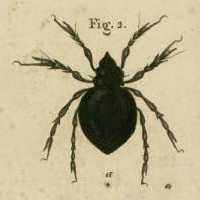| Damaeidae Temporal range:
| |
|---|---|

| |
| Belba corynopus | |
| Scientific classification | |
| Kingdom: | |
| Phylum: | |
| Class: | |
| Order: | |
| Superfamily: | |
| Family: | Damaeidae Berlese (1896)
|
Damaeidae Berlese (1896) is a family of mites. [1] Alternative names for the family include Belbidae Willmann (1931), and Belbodamaeidae Bulanova-Zachvatkina (1967) or Hungarobelbidae (1996). [2] They had been previously considered to be distinct families. [1] [3] [4]
Species of the family are extant in Eurasia and Northern America. [5] Related species exist in New Zealand and South America. [4]
Behaviour
Most species of the family live in plant litter, mosses, decaying woods and organic soil layers. The family is composed of fungivores. They have an important role in regulation of the density of fungi that is harmful for plants. [5]
List of genera
The following genera are part of this family: [6] [7] [8] [9]
References
- ^ a b J. G. Rodriguez (22 October 2013). Recent Advances in Acarology. Elsevier Science. p. 533. ISBN 978-1-4832-7554-3.
- ^ Perez-Iñigo C. (1997). "Acari: Oribatei, Gymnonota. In: Ramos, M. A., (Ed.)". Fauna Iberica. 9. Museo Nacional de Ciencias Naturales: 342.
- ^ Jan Mourek (May 2010). "Systematics of oribatid mite families Damaeidae and Gymnodamaeidae (Acari: Oribatida), feeding ecology of selected oribatid species". Retrieved 21 December 2016.
- ^ a b Milan Daniel; B. Rosický (14 November 2014). Proceedings of the 3rd International Congress of Acarology. Springer. p. 77. ISBN 978-94-010-2709-0.
- ^ a b Xie, Lixia; Yang, Maofa; Huang, Rong (15 July 2011). "A new species of the genus Epidamaeus (Acari, Oribatida, Damaeidae) from China". ZooKeys (119): 29–36. doi: 10.3897/zookeys.119.1629. PMC 3192423. PMID 21998515.
- ^ "Catalogue of Life: 2011 Annual Checklist". www.catalogueoflife.org. 2011. Retrieved 21 December 2016.
- ^ "Belbidae". Fauna Europaea. 29 August 2013. Archived from the original on 17 December 2005. Retrieved 21 December 2016.
- ^ "Belbodamaeidae". Fauna Europaea. 29 August 2013. Archived from the original on 17 December 2005. Retrieved 21 December 2016.
- ^ "Damaeidae". Fauna Europaea. 29 August 2013. Archived from the original on 17 December 2005. Retrieved 21 December 2016.
Further reading
- S. G. Ermilov (2010). "MORPHOLOGY OF JUVENILE INSTARS OF METABELBA PAPILLIPES (ACARI, ORIBATIDA, DAMAEIDAE" (PDF). Acarina. 18 (2): 273–279.
External links
Wikimedia Commons has media related to
Damaeidae.
Wikispecies has information related to
Damaeidae.
- Damaeidae Species Listing in Joel Hallan's Biology Catalog by Dr. Heinrich Schatz
- Damaeidae Berlese, 1896 at ITIS
- Damaeidae at the National Center for Biotechnology Information